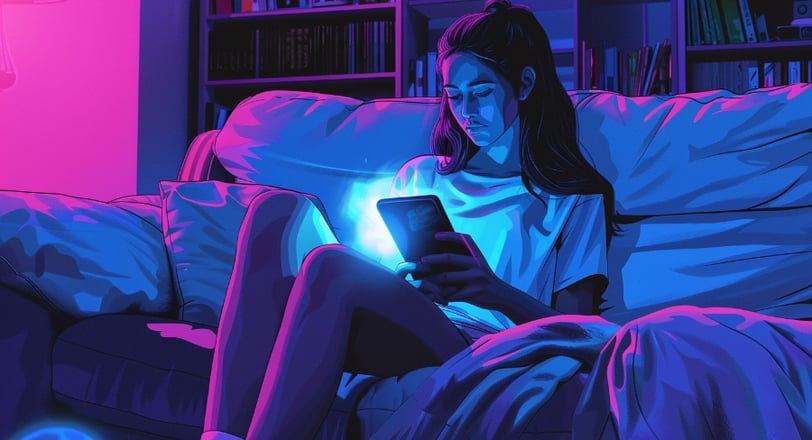The Impact of Blue Light on Sleep for Soccer Players
Turn off to tune in: managing screen time for optimal sleep and performance.
SLEEP
Ellie Maybury


As a soccer player, achieving optimal performance is more than physical training and tactics. Sleep quality is critical in recovery, mental sharpness, and overall health. In our modern world, the screens we use every day—phones, tablets, and computers—emit a type of light known as blue light, which can significantly impact the quality of our sleep. Understanding this impact can help athletes make informed decisions about their technology use and improve their overall performance on the field.
Understanding Blue Light
Blue light is a high-energy, short-wavelength light primarily emitted by the sun but also by digital screens such as smartphones, tablets, computers, and televisions. While natural exposure to blue light during the day can be beneficial—boosting alertness and mood—it becomes problematic at night.
The Science of Blue Light and Sleep
Exposure to blue light in the evening can disrupt our natural sleep-wake cycle, known as the circadian rhythm. This disruption occurs because blue light inhibits melatonin production, the hormone responsible for signaling our bodies that it's time to sleep. Research shows that using screens emitting blue light can delay melatonin production, making it harder to fall asleep and enter the deep, restorative stages of sleep that are so crucial for physical recovery.
Sleep and Soccer Players
For soccer players, sleep isn't just downtime. It's a critical period for physical recovery and cognitive processing. During sleep, the body undergoes tissue repair, muscle growth, and recovery processes that are vital for athletic performance. Poor sleep can lead to slower reaction times, less focus during games and practices, and an overall decrease in performance levels. Moreover, chronic sleep disruption can increase the risk of injuries and prolong recovery time.
Practical Tips to Mitigate Blue Light Exposure
Fortunately, there are several strategies soccer players can use to mitigate the effects of blue light.
Establish a screen curfew: Set a time limit for stopping all screen use before bed, ideally 90 minutes to 2 hours before sleep. This practice helps your body produce melatonin at the right time, encouraging a natural sleep onset.
Opt for dim, warm lights at night: Avoid bright, harsh lights in the evening. Use lamps with warm bulbs that do not emit blue light, helping your body wind down naturally. Warm lights can create a calming environment that is more conducive to sleep.
Increase morning light exposure: To help reset your internal clock, get plenty of natural light during the morning. This exposure can help reinforce your body's natural rhythms, improving nighttime sleep quality. Venture outside within 30-60 minutes of waking up. If you wake before the sun is out, utilize artificial lights and go outside once the sun rises. On bright, cloudless days, aim for 10 minutes; on cloudy days, aim for 20 minutes; and on very overcast days, aim for 30-60 minutes.
Create a sleep-conducive environment: Ensure your sleeping area is conducive to rest. This means a cool, quiet, and dark room. Keep your room cool, ideally between 60-67°F (15-19°C). Minimize noise disruptions with earplugs or a white noise machine if needed. Darken your room with blackout curtains, or use a sleep mask to block out light.
Create a relaxing pre-bed routine: Develop a pre-sleep routine that involves relaxing activities such as reading a book, stretching, or meditating. This routine can signal your body that it's time to wind down and prepare for sleep.
Use blue-light filters: Most modern devices offer settings that reduce blue light emissions. Features like "Night Shift" on iPhones or "Night Mode" on Android and Windows devices can be beneficial. Activating these features or using blue light filtering apps in the evening can help lessen blue light's impact on sleep.
Consider wearing blue-light-blocking glasses: If you use screens extensively in the evening, consider glasses that block blue light. These can be particularly useful during late-night studying or game analysis sessions.
Frequently Asked Questions
How does blue light affect sleep in soccer players?
Blue light exposure can disrupt sleep patterns, reducing recovery quality for soccer players.What are common sources of blue light exposure?
Learn about blue light from screens, devices, and artificial lighting.How can soccer players minimize blue light exposure?
Discover strategies like screen time limits and blue light filters to improve sleep.
Conclusion
While technology is invaluable for training, strategy, and relaxation, managing your screen time in the evening is crucial for optimal sleep and performance. By understanding and mitigating the effects of blue light, you can enhance your sleep quality and, in turn, your performance on the soccer field. Remember, good sleep is as important as a good training session. Prioritize it, and your body will thank you on and off the field.
Looking to improve you sleep?
Never miss an article!
If you found this blog helpful, don't miss out on future insights—subscribe here!
Copyright © 2024 Soccer Herformance LLC. All rights reserved.


